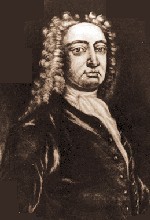Search
Charles Radclyffe, 5th Earl of Derwentwater

Born September 3, 1693 - Died December 8, 1746
Charles Radclyffe, 5th Earl of Derwentwater was an English-born peer.
Radclyffe was born on September 3rd, 1693 in Little Parndon, Essex, England. The Radclyffe family were loyal followers of the House of Stuart. Radclyffe's brother, James, was raised in the court of the Stuarts in France as a companion to James Francis Edward Stuart, also known as the Old Pretender and King James III.
Radclyffe and his brother James, James was now 3rd Earl of Derwentwater, traveled to England and participated in the Jacobite rising of 1715, also known as the fifteen. The rising was an attempt by the Old Pretender to regain the thrones of England, Scotland and Ireland. The rising was unsuccessful and Radclyffe and his brother were captured and held in London. Both men were convicted of treason and sentenced to be executed. James was executed on Tower Hill in 1716, declaring his loyalty to the Old Pretender and to the Roman Catholic church before being executed. Radclyffe, through a clever ruse was able to escape his captivity and return to France.
James Radclyffe had a son, John who inherited the title of 4th Earl of Derwentwater. When John passed away in 1731 Charles Radclyffe became the 5th Earl of Derwentwater.
After receiving his title, Radclyffe traveled to Rome where he was an active member of the court of James III (the Old Pretender). He served as the private secretary of Charles Edward Stuart, also known as Bonnie Prince Charlie and the Young Pretender. Radclyffe also served in Dillon's Regiment which was formed in 1688 at the beginning of the Jacobite war. During his service in the regiment Radclyffe was captured by British forces again. This time he was heading to Scotland to aide Bonnie Prince Charlie during the Jacobite rising of 1745. The 1745 rising, also known as the forty-five, was Bonnie Prince Charlie's attempt to return to the British Thrown. Radclyffe was one of the few Englishmen who took part in the fifteen and the forty-five.
After being captured Radclyffe was condemned to death under his previous sentence.
Radclyffe was beheaded on December 8th, 1746.
Radclyffe is credited with establishing Lodge Au Louis d'Argent, although the date of the establishment of the lodge is in question. It is also claimed Chevalier Ramsay gave his famous speech at Lodge Au Louis d'Argent. In it, Ramsay tied Freemasonry to the Knights Templar in 1737. After Lodge Au Louis d'Argent, several more lodges were established and Radclyffe became the first Grand Master of the Grand Lodge of France.
This article provided by Brother Eric C. Steele.